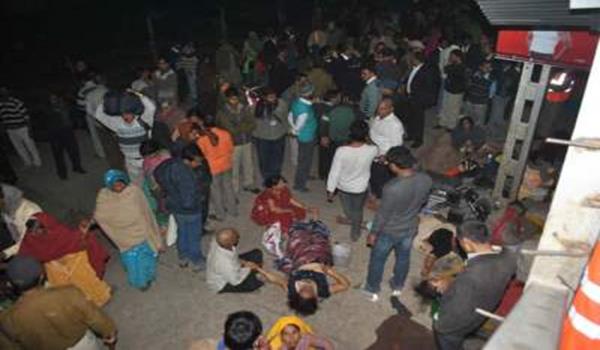Many feared dead and dozens injured after footbridge collapses in northern Indian city hosting Hindu Kumbh Mela festival
 Officials say the death toll from a stampede during a Hindu festival in northern India has risen to 36.
Officials say the death toll from a stampede during a Hindu festival in northern India has risen to 36.
Medical superintendent Dr P Padmakar of the main state-run hospital said Monday that at least 30 other pilgrims were injured in the crush at the main rail station in the pilgrim city of Allahabad.
Padmakar said 23 of the dead were women.
Tens of thousands of people were in the station when a section of a footbridge there collapsed, leading to the stampede late on Sunday.
Indian railway minister Pawan Bansal said the stampede happened in the Allahabad train station on Sunday evening. News reports said tens of thousands of people were in the station when a section of a footbridge there collapsed, leading to the stampede.
Television showed large crowds pushing and jostling at the train station as policemen struggled to restore order.
“There was complete chaos. There was no doctor or ambulance for at least two hours after the accident,” a witness told NDTV news channel.
An estimated 30 million Hindus were expected to take a dip at the Sangam, the confluence of the Ganges, the Yamuna and the mythical Saraswati rivers on Sunday, one of the holiest bathing days of theKumbh Mela, or Pitcher Festival. The festival lasts 55 days and is one of the world’s largest religious gatherings.
The auspicious bathing days are decided by the alignment of stars, and the most dramatic feature of the festival is the Naga sadhus ascetics with ash rubbed all over their bodies, wearing only marigold garlands leaping joyfully into the holy waters.
According to Hindu mythology, the Kumbh Mela celebrates the victory of gods over demons in a furious battle over nectar that would give them immortality. As one of the gods fled with a pitcher of the nectar across the skies, it spilled on four Indian towns_Allahabad, Nasik, Ujjain and Haridwar.
The Kumbh Mela is held four times every 12 years in those towns. Hindus believe that sins accumulated in past and current lives require them to continue the cycle of death and rebirth until they are cleansed. If they bathe at the Ganges on the most auspicious day of the festival, believers say they can rid themselves of their sins.














